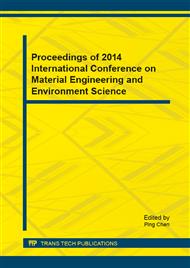p.454
p.460
p.465
p.470
p.475
p.482
p.486
p.490
p.497
Effect of Corrosion Inhibitor on the Compressive Strength of Polymer-Modified Cement Mortars
Abstract:
This study examined initial flow and compressive strength development of polymer-modified cement mortar according to the addition of corrosion inhibitor. Test results showed that with the increase of the amount of corrosion inhibitor, the initial flow of mortars increased whereas compressive strength decreased. The strength development of mortar specimens could be reasonably predicted using the modified ACI 209 equations.
Info:
Periodical:
Pages:
482-485
DOI:
Citation:
Online since:
November 2014
Authors:
Price:
Сopyright:
© 2014 Trans Tech Publications Ltd. All Rights Reserved
Share:
Citation:


